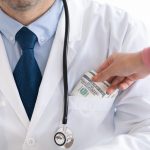U.S. doctors rake in $12 billion from Pharma and medical giants in 10 years
 (NaturalHealth365) According to a report by JAMA Network, pharmaceutical and medical device companies have paid U.S. doctors a staggering $12 billion over the past decade. These financial incentives, given in exchange for prescribing medications and medical equipment, highlight the urgent need for reform in the healthcare industry.
(NaturalHealth365) According to a report by JAMA Network, pharmaceutical and medical device companies have paid U.S. doctors a staggering $12 billion over the past decade. These financial incentives, given in exchange for prescribing medications and medical equipment, highlight the urgent need for reform in the healthcare industry.
The real question looming is: Can Americans trust physicians to make the best possible treatment decisions amidst such substantial financial influences?
Undeniable truth about the U.S. healthcare system
The privatization of the American healthcare industry has undeniably spurred significant breakthroughs that have enhanced the human condition worldwide. However, the rapid advancement of medical technology has brought about its own set of challenges.
Big Pharma and Medtech are collaborating closely with the nation’s doctors, but not necessarily in the best interest of the American public. While many Americans place implicit trust in their physicians, assuming they prioritize patient well-being, the pervasive financial corruption within the healthcare industry tells a different story.
This corruption is driving up the costs of prescription medications, medical equipment, and surgical procedures, making them increasingly unaffordable for many individuals.
Highlighting the medical specialties that are the most compromised
Sift through the report linked above, and you’ll find the medical devices and pharmaceutical industries made an incredible 85,087,744 payments to doctors spanning 39 medical specialties. In total, 57% of the nation’s practicing physicians received financial kickbacks for prescribing medications, medical equipment, and other forms of medical care.
Cardiologists, neurologists, psychiatrists and orthopedic surgeons were paid the most. Those in the psychological and neurological fields raked in an impressive $1.32 billion. Orthopedic surgeons received even more, notching an incredible $1.36 billion in the decade.
In contrast, pediatric and trauma surgeons, often characterized as the most diligent and caring in the medical industry, received the fewest financial kickbacks. Trauma surgeons received $6.96 million across the decade, while pediatric surgeons received $2.89 million.
Zooming in further, the largest financial payments were linked to the prescription of specific medications like the immunosuppressant Humira and blood thinners Eliquis and Xarelto. Similarly, examining medical devices with significant payouts reveals the heart valve CoreValve Evolut and two robotic surgery systems, the Mako SmartRobotics and the da Vinci Surgical System, dominating the landscape.
Why were financial payments made to doctors and other medical professionals?
The financial payments detailed above were made primarily for marketing purposes. The logic in making such payments directly to doctors, who in turn pushed drugs and equipment on patients, is that doing so is cheaper than spending billions through other broader marketing and outreach campaigns.
The breadth of the analysis encompassed financial payments made to doctors for education about prescription medications, durable equipment, and more. The funding was also used for auxiliary purposes, including consulting, entertainment, and grants.
Avoid becoming a victim of medical industry corruption
Readers possess personal agency both as patients of medical practices and as taxpayers. You hold the right to inquire whether your doctor has received financial kickbacks from drugmakers, manufacturers of durable medical equipment, and other entities.
Furthermore, you have the power to contact your Congressional representatives and other lawmakers to express your concerns about corruption in the medical industry.
Lastly, take control of your well-being by making healthy diet and lifestyle choices. Empower yourself with knowledge about holistic and natural health solutions rather than relying solely on Big Pharma medications. Remember, not becoming a medical statistic is all about taking good care of yourself.
Sources for this article include:



